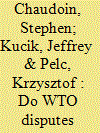| Srl | Item |
| 1 |
ID:
146200


|
|
|
|
|
| Summary/Abstract |
Exporters, trade lawyers, policy makers, and academics see the WTO's Dispute Settlement Understanding as an important, though costly, venue for facilitating the removal of harmful barriers to trade. If this conventional wisdom holds, then disputes should increase trade. We provide a careful analysis of trade flows in the wake of WTO disputes. We find that WTO disputes do not increase the respondent country's imports of the products at issue. Instead, our analysis shows very narrow effects from disputes. These depend on the dispute outcome and issue area. Although we find variation across countries in their responsiveness to disputes, no single explanation accounts for this variation. Our evidence casts doubt on arguments that dispute settlement promotes trade between members.
|
|
|
|
|
|
|
|
|
|
|
|
|
|
|
|
| 2 |
ID:
192122


|
|
|
|
|
| Summary/Abstract |
This article contributes to the ongoing debate over China’s behaviour in the multilateral trading system established by the World Trade Organization (WTO). It offers a systemic review of all completed WTO disputes against China in the past two decades and a critical analysis of four political factors embedded in China’s impressive record of compliance. In doing so, it develops an analytical framework for future studies on China’s approaches to WTO compliance and its interaction with international trade rules more broadly. While China’s trade policy has become more sensitive to the changing external environment, this framework will remain highly relevant to studies of China’s behaviour on trade and other economic matters and ways to engage with the emerging global superpower in the years ahead.
|
|
|
|
|
|
|
|
|
|
|
|
|
|
|
|